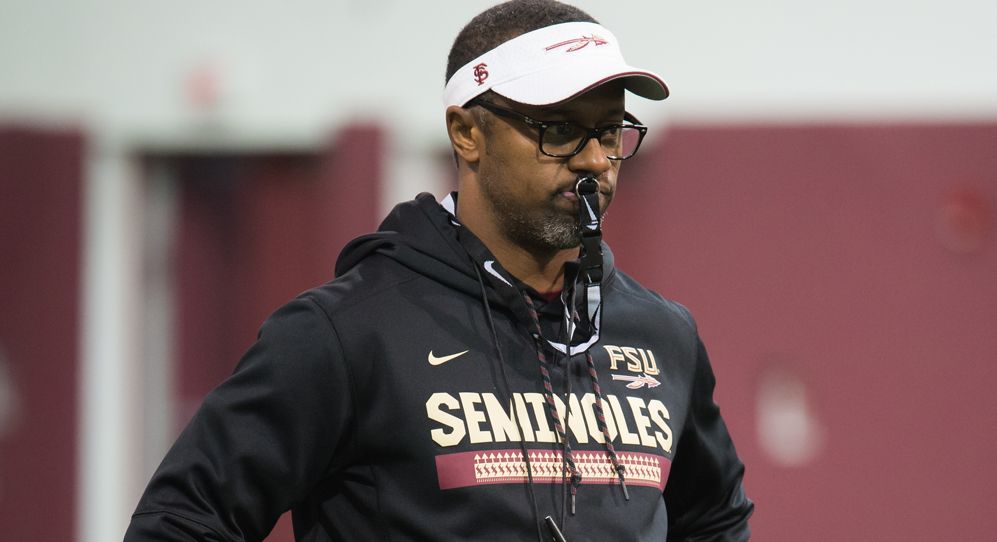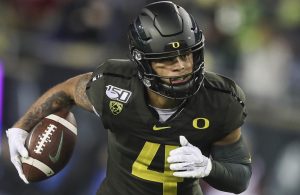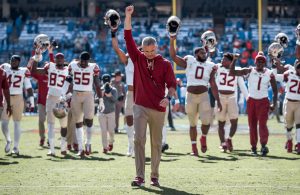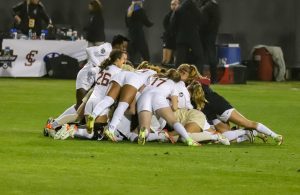- Sunday Seminole Summary: FSU Football Adds Pair of WR Transfers
- Sunday Seminole Summary: FSU Football Exits ESD With Top-15 Class
- Sunday Seminole Summary: FSU Soccer Tops BYU for Third National Championship
- Sunday Seminole Summary: FSU Soccer Advances to National Championship Match
- Seminole Sunday Summary: FSU Soccer Heads Back to College Cup
- Seminole Sunday Summary: FSU Soccer Reaches Sweet 16; Football Tops Boston College
- Seminole Sunday Summary: FSU Soccer Wins ACC, Advances to Second Round of NCAA Tournament; FSU Football Rallies Past Miami
- Seminole Sunday Summary: FSU Soccer Tops Wake on OT to Advance to ACC Final
- Seminole Sunday Summary: FSU Football Crushes UMass for Third Straight Win
- Seminole Sunday Summary: FSU Soccer Stays Perfect with Pair of Wins
FSU Football: Taggart vs. Opponents Based on Comparative Talent
- By Clint Eiland
- Updated: August 13, 2018
 Colin Abbey/FSU athletics
Colin Abbey/FSU athleticsMuch of the hype surrounding new head coach Willie Taggart’s “lethal simplicity” is the talent he has to work with at Florida State.
The reasoning is that since Taggart was able to produce an elite offense while at South Florida, he’ll be able to replicate it consistently at a program with Florida State’s resources. His one year at Oregon gave a glimpse of what he could achieve, though an injury to his starting quarterback derailed some of that promise.
The point remains that Taggart has quite the arsenal to work with in 2018. With it comes the expectations that his FSU team will hit the ground running and win around nine games in his first season. A program like Florida State is allowed to go through transition years, but it isn’t rebuilding like other teams. Florida State has elite talent, and many have wondered how exactly Taggart will perform with this amount of talent.
One way to do that is to look at his past results against less talented and similarly talented opponents. The 247Sports Team Talent Composite rankings can provide us with some numbers.
We only have data from 2015-17. While that limits the analysis, it does prove insightful since it captures both the apex of his USF tenure and his first year at Oregon. It was in the middle of the 2014 season that he began a shift towards his current offense. Thus the three seasons examined are more like what FSU fans will be seeing on the field.
“Similarly talented teams” is defined as those within 10 spots on the talent composite. That is fairly arbitrary, but to our knowledge there is no established rule. It will have to do for the purposes of this article.
There are a couple of caveats that need mentioning. The first is that his 2015 and 2016 seasons at USF provide a more accurate look when it comes to record vs. similarly talented opponents. USF’s natural recruiting ceiling means that it will be playing teams with much closer talent levels, since its rankings fall into a certain range. Simply put, the lower down the list, the less a difference the talent composite makes.
To demonstrate: the gap between the 50th most talented team (Texas Tech) and the 60th most talented team (Washington State) is 27.21 points. The gap between the 10th most talented team (Notre Dame) and the 20th most talented team (Miami) is 86.06 points. College football recruiting is top-heavy by nature.
Secondly, talent is only one component of determining a match-up. In some of the games examined, USF was a clear underdog because it was simply not the better team, regardless of the overall talent. Factors like experience and time spent at a program are just as important.
Against Less Talented Opponents
USF 2015: 6-3
USF 2016: 9-1
Oregon 2017: 6-1
Combined: 21-5 (.807)
Fans upset with the random losses to less talented opponents should be optimistic. Those losses happen to every program, but the last three years of the Jimbo Fisher era were especially prone to head-scratching defeats. Taggart’s record vs. less talented opponents is actually better than Fisher’s, which came out to 26-8 (.764) in the same time frame.
The loss at USF in 2016 was to a 10-win Temple team. His one loss while at Oregon was to Washington State — the first opponent after starting quarterback Justin Herbert went out with a broken collarbone. So the losses weren’t completely shocking outcomes.
Assuming that the 2017 talent composite is fairly similar to the 2018 rankings (which have not been released yet) FSU will face 10 teams in 2018 that are less talented than it. At least eight wins from that group should be expected.
Against Similarly Talented Opponents
USF 2015: 2-0
USF 2016: 1-0
Oregon 2017: 1-3
Combined: 4-3 (.571)
Taggart didn’t have much trouble disposing of teams on equal footing while at USF. All three of his losses came at Oregon to the likes of Stanford, Arizona State, and Washington. The Arizona State defeat was a close 2-point loss, while the other two were blowouts. Having Justin Herbert would’ve certainly helped, but Washington would be the favorite regardless. Stanford is a bit trickier, since the Cardinals were just 10.5-point favorites and both teams had a 4-2 record.
The one victory at Oregon was over Nebraska. The final score came out to 42-35 but the Ducks were up 42-14 at halftime.
FSU has just two opponents on the schedule that come within 10 spots of its overall talent: Notre Dame and Clemson. If past history is indicative, one of those games might be a win.
Against More Talented Opponents
USF 2015: 0-2
USF 2016: 0-1
Oregon 2017: 0-1
Combined: 0-4
There’s an obvious problem with this category due to Florida State’s current team talent ranking. The Seminoles rank fifth in the nation, meaning our criteria of teams within 10 spots isn’t much help. Assuming that FSU keeps up its recruiting efforts, there’s basically no team that will qualify as having substantially more talent.
Even if we change the limit to something like 20 points, there’s only three teams that qualify and none are regular opponents. FSU is and will be the most talented team or at least on equal footing against virtually all of its opponents.
Examining Taggart’s record here isn’t all that helpful, except if FSU makes it to certain postseason match-ups. Going by just the regular season expectations, FSU has a floor of around nine wins. That’s perfectly in line with what most perceive as Florida State’s program floor regardless of the coach at the helm.
The main lesson here is that Taggart’s recent history indicates a coach that plays much more in line with expectations. Certain coaches are known for doing more with less, while others can’t seem to get over a hump. Taggart’s success (like many coaches) is linked with the talent that he can assemble. He rarely disappoints and when he’s matched up against a team with similar talent, it’s going to be a dogfight at the very least.
Related Posts
One Comment
You must be logged in to post a comment Login
Leave a Reply
Cancel reply
You must be logged in to post a comment.




finance85
August 13, 2018 at 3:46 pm
Nice article. FSU clearly underperformed last year based on talent. That obviously leaves coaching as the main problem. Since there’s only one coach remaining from the previous staff, FSU has arguably upgraded it’s coaching at every position except TE. If we look at coaching as an extension of talent, until proven otherwise, Clemson gets the nod. If we look at it that way, FSU should go 9-2 against everyone but Clemson, and lose to Clemson, for a 9-3 record this year.